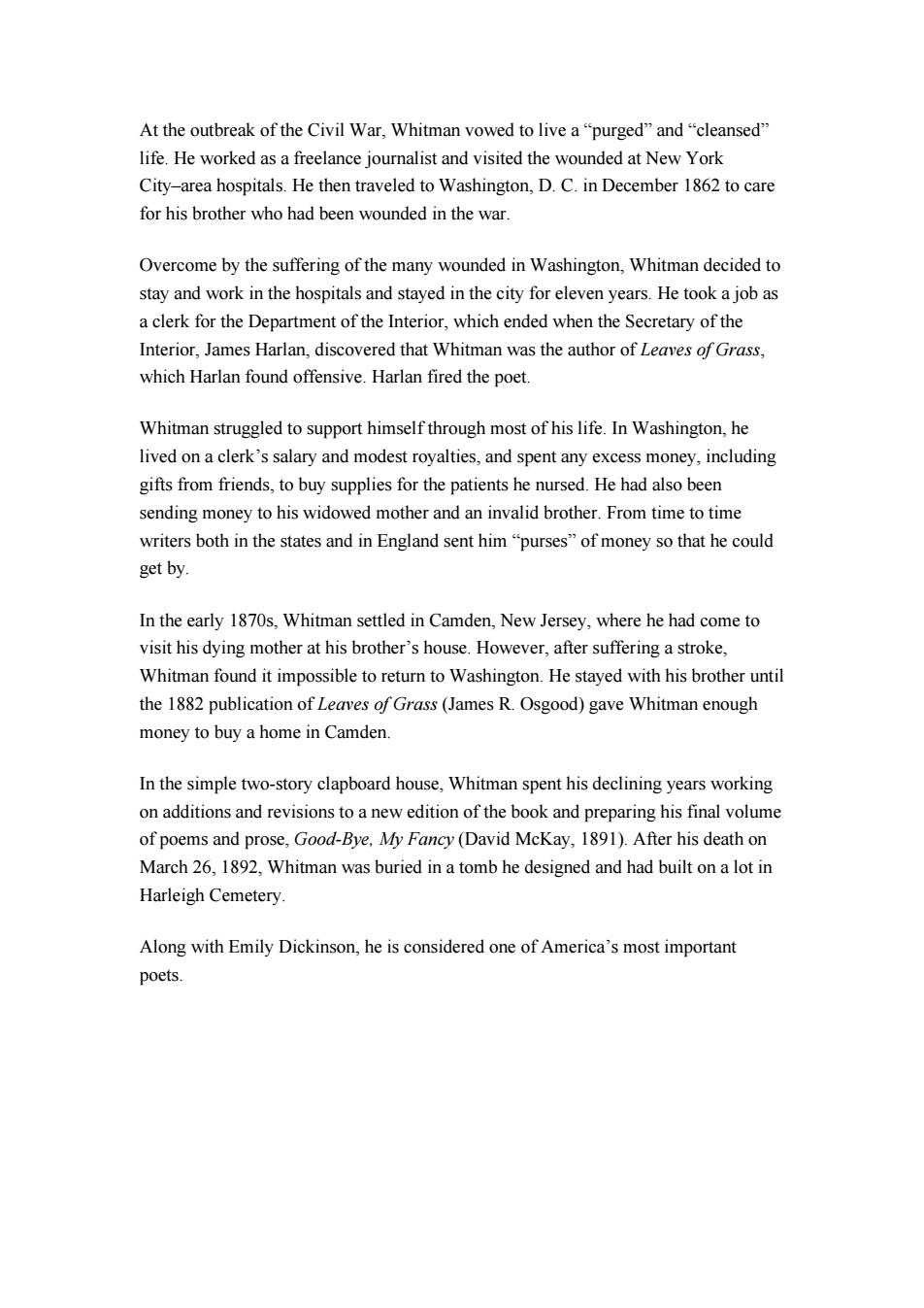正在加载图片...

At the outbreak of the Civil War,Whitman vowed to live a "purged"and"cleansed" life.He worked as a freelance journalist and visited the wounded at New York City-area hospitals.He then traveled to Washington,D.C.in December 1862 to care for his brother who had been wounded in the war. Overcome by the suffering of the many wounded in Washington,Whitman decided to stay and work in the hospitals and stayed in the city for eleven years.He took a job as a clerk for the Department of the Interior,which ended when the Secretary of the Interior,James Harlan,discovered that Whitman was the author of Leaves ofGrass, which Harlan found offensive.Harlan fired the poet. Whitman struggled to support himself through most of his life.In Washington,he lived on a clerk's salary and modest royalties,and spent any excess money,including gifts from friends,to buy supplies for the patients he nursed.He had also been sending money to his widowed mother and an invalid brother.From time to time writers both in the states and in England sent him "purses"of money so that he could get by. In the early 1870s,Whitman settled in Camden,New Jersey,where he had come to visit his dying mother at his brother's house.However,after suffering a stroke, Whitman found it impossible to return to Washington.He stayed with his brother until the 1882 publication of Leaves of Grass (James R.Osgood)gave Whitman enough money to buy a home in Camden. In the simple two-story clapboard house,Whitman spent his declining years working on additions and revisions to a new edition of the book and preparing his final volume of poems and prose,Good-Bye,My Fancy (David McKay,1891).After his death on March 26,1892,Whitman was buried in a tomb he designed and had built on a lot in Harleigh Cemetery Along with Emily Dickinson,he is considered one of America's most important poets.At the outbreak of the Civil War, Whitman vowed to live a “purged” and “cleansed” life. He worked as a freelance journalist and visited the wounded at New York City–area hospitals. He then traveled to Washington, D. C. in December 1862 to care for his brother who had been wounded in the war. Overcome by the suffering of the many wounded in Washington, Whitman decided to stay and work in the hospitals and stayed in the city for eleven years. He took a job as a clerk for the Department of the Interior, which ended when the Secretary of the Interior, James Harlan, discovered that Whitman was the author of Leaves of Grass, which Harlan found offensive. Harlan fired the poet. Whitman struggled to support himself through most of his life. In Washington, he lived on a clerk’s salary and modest royalties, and spent any excess money, including gifts from friends, to buy supplies for the patients he nursed. He had also been sending money to his widowed mother and an invalid brother. From time to time writers both in the states and in England sent him “purses” of money so that he could get by. In the early 1870s, Whitman settled in Camden, New Jersey, where he had come to visit his dying mother at his brother’s house. However, after suffering a stroke, Whitman found it impossible to return to Washington. He stayed with his brother until the 1882 publication of Leaves of Grass (James R. Osgood) gave Whitman enough money to buy a home in Camden. In the simple two-story clapboard house, Whitman spent his declining years working on additions and revisions to a new edition of the book and preparing his final volume of poems and prose, Good-Bye, My Fancy (David McKay, 1891). After his death on March 26, 1892, Whitman was buried in a tomb he designed and had built on a lot in Harleigh Cemetery. Along with Emily Dickinson, he is considered one of America’s most important poets